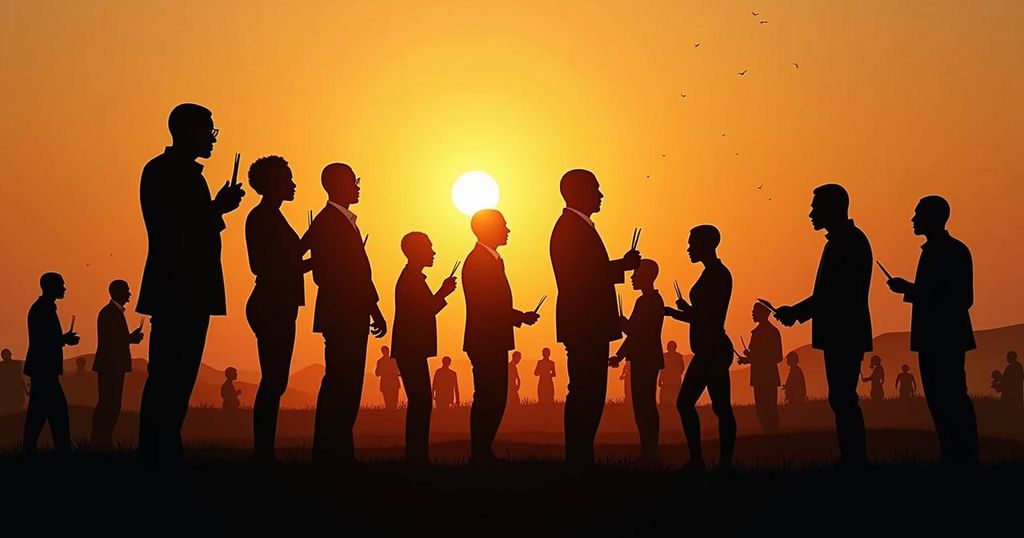Mozambique’s Political Evolution: The 2023 Elections and the Challenge of Change
Mozambique is preparing for a pivotal election that will transition away from leaders rooted in the independence struggle, with presidential candidate Daniel Chapo of Frelimo, born after independence, promising change amidst a backdrop of corruption allegations. Facing strong challengers including Venâncio Mondlane and Ossufo Momade, Chapo’s ability to secure voter trust and navigate electoral integrity issues will be critical. The election results hold significant implications for Mozambique’s socio-economic future, with a majority of citizens living in extreme poverty.
Mozambique is approaching a critical election that will initiate a shift in presidential leadership as the nation transitions away from leaders who have emerged from the historic independence struggle against Portuguese colonization. This election marks a notable departure for the ruling Frelimo party, as it presents Daniel Chapo, a 47-year-old candidate born after independence, in an attempt to rejuvenate its image following nearly five decades in power. Chapo’s rising popularity appears to stem from a public desire for change, particularly in light of allegations of corruption that have plagued Frelimo during its extensive period of governance. Political commentator Charles Mangwiro observes that the Frelimo campaign is experiencing backlash in some regions, with campaigners facing open disapproval from constituents dissatisfied with the party’s long-standing rule. As Mozambique prepares for presidential, parliamentary, and gubernatorial elections, President Filipe Nyusi will complete his tenure, passing the leadership baton to Chapo, who faces the challenge of overcoming significant trust issues tied to Frelimo’s past. The nation grapples with fallout from a prominent corruption scandal, severely impacting its economy, which adds to the complexities surrounding Chapo’s candidacy. He has worked to disassociate himself from the party’s corrupt practices during rallies, captivating audiences with promises of renewal and hope. Critics, however, express skepticism about Chapo’s ability to effect meaningful change while remaining part of a party widely linked to corruption. Journalist Mirna Chitsungo emphasizes the difficulty Chapo faces in convincing voters that genuine reform is achievable from within a party long accused of fostering a corrupt environment. The elections will also feature significant competition, including Venâncio Mondlane, a first-time presidential candidate presenting a fresh vision, and Ossufo Momade, who leads the Renamo opposition party amidst claims of electoral injustice from previous elections. Mondlane has successfully resonated with younger voters, advocating pride in Mozambican identity, while Momade positions himself as a peace champion, having previously negotiated a peace agreement ending civil conflict. Both candidates have the potential to dilute the support base for Frelimo, thereby complicating Chapo’s chances of securing an outright victory. Electoral integrity remains a critical focus, as allegations of voter registration irregularities—particularly the presence of ‘ghost voters’—cast doubt on the legitimacy of the elections. Independent audits indicate a substantial number of false registrations, potentially influencing results in favor of Frelimo. Nevertheless, both Frelimo and electoral authorities assert that the elections will adhere to principles of fairness and transparency. As the electoral landscape evolves, the outcomes hinge on whether voters will embrace the candidates presenting themselves as heralds of change or remain committed to the historic party that has led the nation since independence. The election results, anticipated amid heightened tension and hope for a transformative direction, underscore the importance of economic stabilization and poverty alleviation in the new government’s agenda.
The upcoming election in Mozambique represents a significant moment in the country’s political landscape, as it signals a departure from the longstanding leadership associated with the independence struggle. The ruling Frelimo party has dominated politics since the nation’s liberation from Portugal in the mid-20th century, and the rise of Daniel Chapo as a candidate marks a potential shift. This election is occurring against a backdrop of economic challenges, corruption scandals, and a persistent insurgency in the north, all of which amplify the public’s discontent with the current regime. The context in which these elections are unfolding is crucial for understanding the potential dynamics and implications for governance and democratization in Mozambique.
The election in Mozambique is poised to redefine the political framework of the country, marking a crucial turning point as both established parties and new candidates vie for the presidency amid public fatigue over historical governance issues. The success of Daniel Chapo’s campaign will depend on his ability to overcome the legacy of corruption associated with Frelimo, while Venâncio Mondlane and Ossufo Momade’s entries into the race introduce fresh elements that may attract disillusioned voters. As momentum builds ahead of the elections, the imperative for a transparent and fair electoral process remains paramount, as does the urgency for new leadership to address the pressing socio-economic dilemmas facing the nation.
Original Source: www.bbc.com




Post Comment